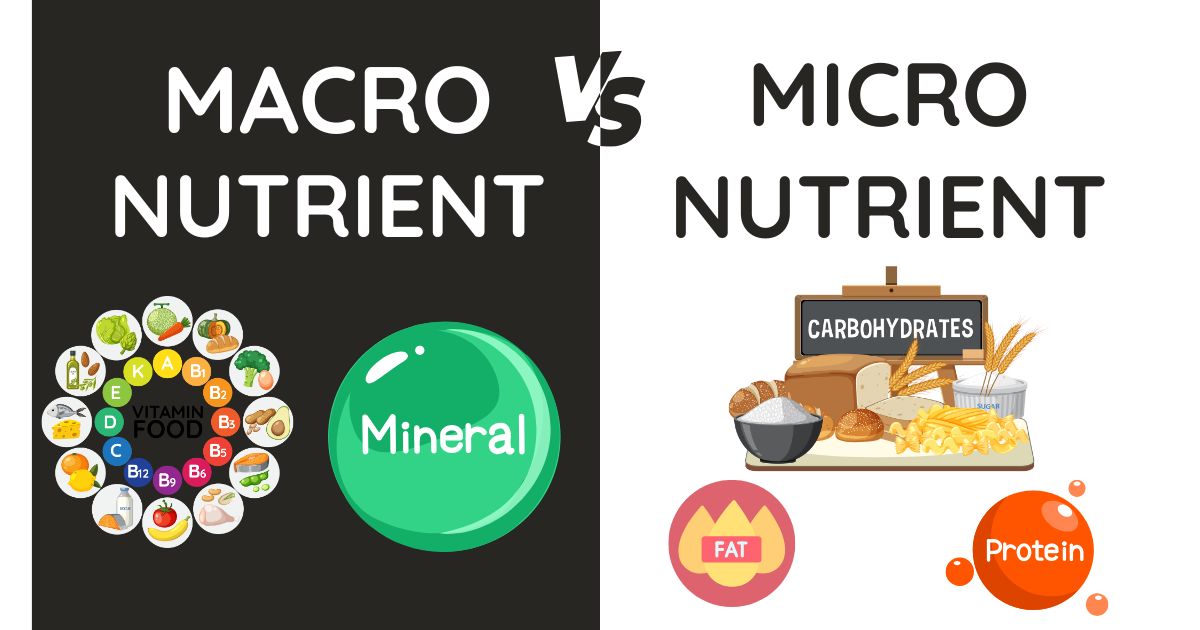Nutrition plays a fundamental role in maintaining overall health, growth, and body functions. Among the many factors contributing to balanced nutrition, macro and micro nutrients are the most crucial. Though often mentioned together, these two groups differ significantly in terms of quantity, function, and sources. Understanding the difference between macro and micro nutrients is essential for making better dietary choices and ensuring the body gets all the elements it needs to function optimally.
In this article, we’ll break down what macro and micro nutrients are, their differences, importance, sources, and how to balance them in your diet.
What Are Nutrients?
Nutrients are chemical compounds found in food that provide energy, help in growth, repair tissues, and regulate body processes. They are broadly categorized into two types:
-
Macronutrients – Required in larger quantities.
-
Micronutrients – Needed in smaller amounts but equally vital.
What Are Macronutrients?
Macronutrients are nutrients that the body needs in large amounts to provide energy and support basic functions. They are the primary building blocks of the diet and contribute to daily calorie intake.
Types of Macronutrients
-
Carbohydrates
-
The body’s main source of energy.
-
Found in foods like rice, bread, pasta, fruits, and vegetables.
-
Broken down into glucose, which fuels body and brain functions.
-
-
Proteins
-
Essential for building and repairing tissues, muscles, and enzymes.
-
Found in meat, dairy, legumes, fish, and nuts.
-
Proteins are made up of amino acids, some of which are essential and must come from food.
-
-
Fats
-
Provide concentrated energy and help absorb fat-soluble vitamins (A, D, E, and K).
-
Found in oils, butter, avocado, seeds, and fatty fish.
-
Healthy fats (unsaturated) are beneficial, while trans fats should be avoided.
-
-
Water (sometimes classified as a macronutrient)
-
Does not provide energy but is needed in large amounts.
-
Regulates body temperature, transports nutrients, and supports digestion.
-
What Are Micronutrients?
Micronutrients are nutrients that the body requires in smaller amounts, but they are essential for overall health and well-being. Unlike macronutrients, micronutrients do not provide energy, but they play a key role in metabolic processes, disease prevention, and maintaining immune function.
Types of Micronutrients
-
Vitamins
-
Organic compounds needed for various biochemical processes.
-
Two types:
-
Water-soluble vitamins (Vitamin C and B-complex) – not stored in the body, need daily intake.
-
Fat-soluble vitamins (A, D, E, K) – stored in the body’s fat and liver.
-
-
-
Minerals
-
Inorganic elements important for bone health, fluid balance, and enzyme function.
-
Examples: Iron, calcium, magnesium, zinc, potassium, and iodine.
-
Key Differences Between Macro and Micro Nutrients
| Aspect | Macronutrients | Micronutrients |
|---|---|---|
| Definition | Nutrients required in large amounts that provide energy. | Nutrients required in small amounts, vital for body processes. |
| Quantity Needed | Grams per day | Milligrams or micrograms per day |
| Types | Carbohydrates, proteins, fats, and water | Vitamins and minerals |
| Function | Provide energy, support growth, build muscles, regulate body functions | Support metabolism, immunity, bone health, prevent deficiencies |
| Energy Contribution | Yes (carbs, proteins, fats provide calories) | No energy contribution |
| Examples | Rice, meat, butter, milk, nuts | Iron, calcium, vitamin C, vitamin D |
Importance of Macronutrients
-
Energy Production – Carbohydrates and fats are primary energy sources, while proteins provide backup energy.
-
Growth and Development – Proteins are vital for tissue and muscle growth.
-
Cellular Function – Fats help form cell membranes and hormones.
-
Hydration and Digestion – Water supports nutrient transport and waste removal.
Importance of Micronutrients
-
Preventing Deficiency Diseases – Lack of micronutrients can cause conditions like anemia (iron deficiency), scurvy (vitamin C deficiency), and rickets (vitamin D deficiency).
-
Boosting Immunity – Vitamins like C, D, and zinc strengthen the immune system.
-
Bone Health – Calcium, magnesium, and vitamin D are crucial for strong bones and teeth.
-
Regulating Metabolism – Micronutrients act as cofactors in enzyme activities and metabolic reactions.
Sources of Macronutrients and Micronutrients
Macronutrient Sources
-
Carbohydrates: Whole grains, potatoes, fruits, vegetables, legumes
-
Proteins: Eggs, chicken, beans, fish, soy, dairy products
-
Fats: Olive oil, nuts, seeds, avocado, salmon
-
Water: Drinking water, fresh fruits, soups, herbal teas
Micronutrient Sources
-
Vitamins:
-
Vitamin A – Carrots, sweet potatoes, leafy greens
-
Vitamin C – Citrus fruits, berries, tomatoes
-
Vitamin D – Sunlight, fortified milk, fatty fish
-
Vitamin E – Almonds, sunflower seeds, spinach
-
Vitamin K – Kale, broccoli, Brussels sprouts
-
-
Minerals:
-
Iron – Red meat, spinach, lentils
-
Calcium – Dairy, fortified plant milk, leafy greens
-
Magnesium – Nuts, seeds, whole grains
-
Zinc – Seafood, beans, pumpkin seeds
-
Potassium – Bananas, potatoes, beans
-
How to Balance Macro and Micro Nutrients in Your Diet
-
Follow a Balanced Diet: Include all food groups in recommended portions.
-
Avoid Processed Foods: They are often rich in calories but poor in micronutrients.
-
Eat the Rainbow: Consuming colorful fruits and vegetables ensures a wide range of vitamins and minerals.
-
Hydrate Adequately: Drink sufficient water daily.
-
Seek Professional Advice: Consult a nutritionist for personalized diet plans, especially if you have health conditions.
Final Thoughts
The difference between macro and micro nutrients lies primarily in the quantity required and their role in the body. While macronutrients provide energy and structural components, micronutrients fine-tune body processes and prevent diseases. Both are equally important, and neglecting either can lead to health issues. A well-balanced diet ensures you get the right proportion of both, promoting long-term wellness and vitality.
Also Read :Do You Know How Many Calories Are in 1 Egg?
FAQs
1. Why are macronutrients important?
Macronutrients provide energy, support growth, and maintain body functions like digestion, muscle repair, and hormone production.
2. Why do we need micronutrients if they don’t provide energy?
Micronutrients help regulate body processes, strengthen immunity, and prevent chronic diseases, even though they don’t provide calories.
3. Can you get all micronutrients from food alone?
Yes, a balanced diet with fruits, vegetables, whole grains, and lean proteins can provide sufficient micronutrients, though some people may need supplements.
4. What happens if you don’t get enough macronutrients?
A deficiency in macronutrients can lead to fatigue, muscle loss, weakened immunity, and overall poor health.
5. What’s the easiest way to balance both macro and micro nutrients?
The best way is to eat a varied diet that includes whole foods, limit processed items, and stay hydrated.



